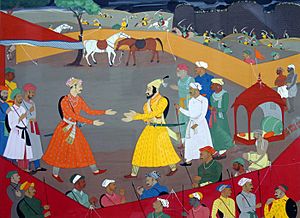Battle of Purandar facts for kids
Quick facts for kids Battle of Purandar |
|||||||||
|---|---|---|---|---|---|---|---|---|---|
| Part of Mughal conquests and The Maratha rebellion | |||||||||
 |
|||||||||
|
|||||||||
| Belligerents | |||||||||
| Maratha kingdom | Mughal Empire | ||||||||
| Commanders and leaders | |||||||||
| Murarbaji † | Jai Singh Diler Khan |
||||||||
| Strength | |||||||||
| Unknown | 12,000 | ||||||||
The Battle of Purandar was a major fight between the powerful Mughal Empire and the Marathas in 1665. The Mughals won this battle.
What Happened Before?
The Mughal Emperor, Aurangzeb, had a big problem with the Maratha king, Shivaji. Aurangzeb wanted to stop Shivaji's growing power. He had sent other generals before, like Shaista Khan and Muazzam, but they had failed.
So, Emperor Aurangzeb chose a new, very skilled general named Jai Singh. Jai Singh was given a huge army of 12,000 soldiers. He was also made the main leader of the Mughal forces in the Deccan region. This meant he had full power to deal with Shivaji.
The Siege of Purandar
Jai Singh started his plan by trying to make Shivaji weaker. He convinced some Maratha nobles to switch sides and join the Mughals. He also promised to lower taxes for the Bijapur Sultanate if they helped him.
Then, Jai Singh's army surrounded the important Purandar Fort. This is called a siege. The Maratha soldiers inside the fort tried many times to get help, but Jai Singh's army stopped them all. They could not break the siege.
In 1665, Shivaji saw that he could not win. He decided to ask for peace. He agreed to a deal with Jai Singh. Shivaji gave up 23 of his 36 forts to the Mughals. Shivaji's son, Sambhaji, was also given a special rank in the Mughal army.
Shivaji did not want to serve Emperor Aurangzeb in person. But he agreed to send his son Sambhaji to the Mughal court. Shivaji also promised to help the Mughals fight against Bijapur. Later, Shivaji and his son Sambhaji went to Agra in 1666 to meet Aurangzeb.
What Happened Next?
After the peace treaty, Shivaji sent some of his Maratha officers to help Jai Singh. They joined the Mughal army in a fight against Bijapur. However, this campaign against Bijapur did not go well for the Mughals.
Later, Jai Singh arranged a meeting between Emperor Aurangzeb and Shivaji. This meeting turned out to be a disaster. Shivaji managed to escape from Agra. This escape led to a new war between the Mughals and the Marathas.
 | Bessie Coleman |
 | Spann Watson |
 | Jill E. Brown |
 | Sherman W. White |

